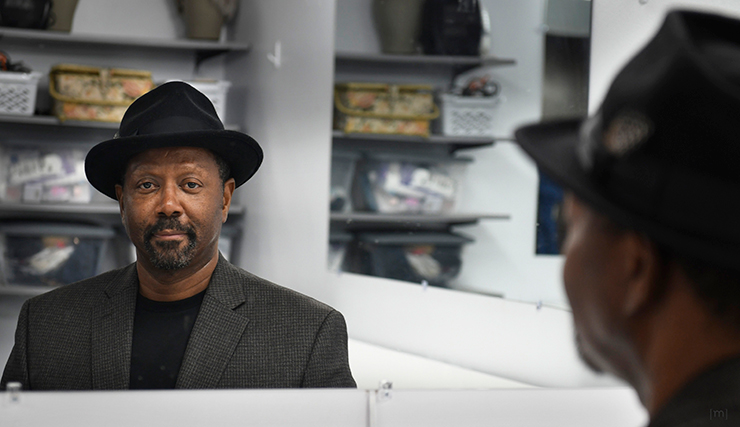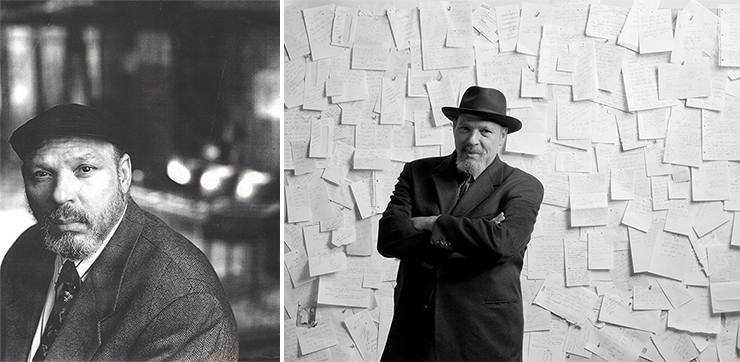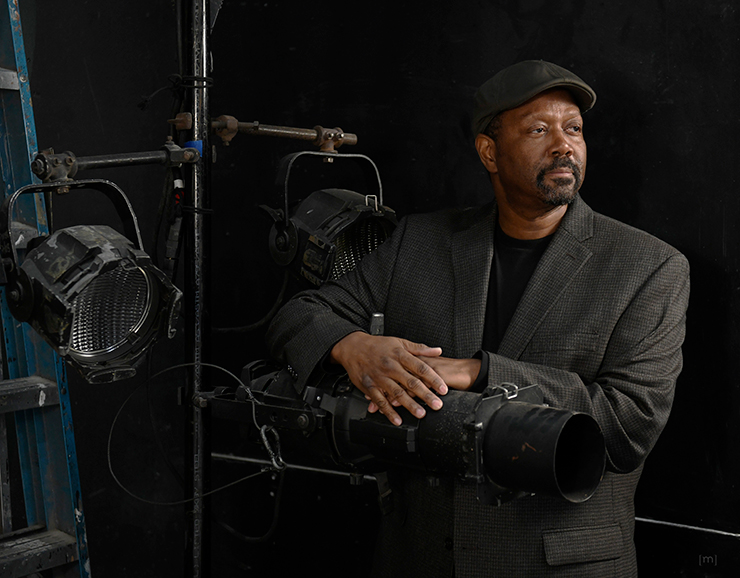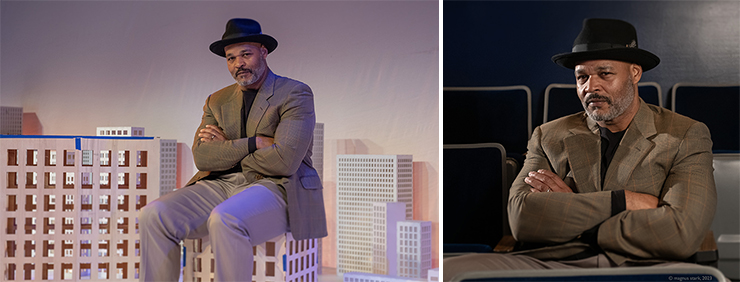
August Wilson's story is told in "How I Learned What I Learned" at GableStage. Robert Strain appears as the playwright in certain performances. (Photo courtesy of Magnus Stark)
If you heard that a renowned two-time Pulitzer Prize-winning playwright dropped out of high school, you may wish to know how he learned what he learned.
GableStage will open its 25th anniversary season by sharing that information with you.

Carey Brianna Hart directs at GableStage for the first time for August Wilson's "How I Learned What I Learned." (Photo courtesy of Bob Lasky)
Specifically, the award-winning, nonprofit professional theater company will open the season with the Miami premiere of August Wilson’s autobiographical one-man play. Its title is “How I Learned What I Learned.” And it will run from Sept. 29-Oct. 22 at GableStage’s long-time home at Coral Gables’ Biltmore Hotel.
Wilson conceived the piece in 2003 with longtime dramaturg and collaborator Todd Kreidler.
The play tells Wilson’s story “poetically and intimately with humor and honesty and authenticity,” says Bari Newport, GableStage's producing artistic director.
Specifically, “How I Learned What I Learned” “charts one man’s journey of self-discovery from being a young poet in Pittsburgh’s Hill District to becoming one of the most celebrated voices of the 20th century,” according to a press release from the theater.

Actor Melvin Huffnagle as playwright August Wilson with director Carey Brianna Hart in a rehearsal for August Wilson's "How I Learned What I Learned" at GableStage. (Photo courtesy of Magnus Stark)
In one of American drama's highest achievements, Wilson (1945-2005), wrote one play for each of the 20th century’s decades, chronicling the African American experience in the U.S. in each. Except for one work, “Ma Rainey’s Black Bottom,” all “American Cycle,” plays (alternately called “Pittsburgh Cycle and “Century Cycle”) take place in Pittsburgh’s African-American Hill District, where Wilson grew up. The exception is “Ma Rainey’s Black Bottom." That play depicts African-American life in 1920s Chicago.
Veteran professional actor Melvin Huffnagle, who is no stranger to Wilson’s work, will portray the late playwright on most nights of GableStage’s run. Meanwhile, longtime South Florida actor Robert L. Strain will perform at 2 p.m. on Oct. 4, 11, and 18, and at 10:30 a.m. on Oct. 12.
Huffnagle, 50, read Wilson’s plays in college and re-read them later in life. Also, Huffnagle performed in two of Wilson’s plays. Specifically, they are “Joe Turner’s Come and Gone,” and “Two Trains Running.” He was also Herald Loomis in “Joe Turner’s Come and Gone” at the University of Florida as part of the performer’s thesis. Also, in May, Huffnagle played the character Memphis in “Two Trains Running” for a production by Miami’s M Ensemble Company.

LEFT: Pulitzer Prize-winning playwright August Wilson: (Photo courtesy of August Wilson Legacy LLC)
RIGHT: August Wilson took theatergoers inside his formative years and creative process in "How I Learned What I Learned," the season opener at GableStage. (Photo courtesy of August Wilson Legacy LLC)
Huffnagle said he is excited to perform "How I Learned What I Learned," The actor and acting professor said the fact that he has performed in a couple of Wilson’s plays will help him portray their author. For instance, Memphis in “Two Trains Running” speaks some of Wilson’s signature poetic monologues. And Wilson’s autobiographical play is essentially a series of monologues.

Actor Robert Strain appears in certain performances of the one-man show as August Wilson in "How I Learned What I Learned" at GableStage. (Photo courtesy of Marcus Stark)
Huffnagle said he is excited to perform "How I Learned What I Learned," The actor and acting professor said the fact that he has performed in a couple of Wilson’s plays will help him portray their author in “How I Learned What I Learned.” For instance, Memphis in “Two Trains Running” speaks some of Wilson’s signature poetic monologues. And Wilson’s autobiographical play is essentially a series of monologues.
“The trap of a play like this is to try to imitate him,” says Huffnagle. However, he added that mimicking Wilson in the play is unnecessary.
“His spirit is in the words,” the actor says. “He is there on the page already. Just breathe life into the words on the page. In fact, “his spirit is in all (his) plays.”
Huffnagle says he can relate to Wilson. That is partly because, like the playwright, Huffnagle is Black and grew up and attended Catholic school in Buffalo, N.Y.
The city, he says, is similar to Wilson’s native Pittsburgh; like that metropolis in Pennsylvania, Buffalo is a Blue-Collar city with a similar ethnic mix.
Huffnagle also visited Wilson’s boyhood home in Pittsburgh’s Hill District in a about a decade ago. He toured the outside of the house. “I could just visualize” Wilson’s Pulitzer-Prize winning
play, “Fences” taking place in the backyard, says Huffnagle.
Getting inside the home was not an option because it was boarded up, he says. Nevertheless, touring the home was a powerful experience for Huffnagle. “It’s hallowed ground,” he said. “The legend was made (there).”
What can GableStage audiences expect?
“They can expect a very entertaining virtuoso performance of this play that will take you back in time and bring you into the world and into the mind of this great playwright,” the actor says.
And, he believes audiences will leave the theater with a better insight and “understanding of
the man who created these wonderful pieces and understand where the influence came from.”
The production's director Carey Brianna Hart says patrons do not have to be familiar with Wilson or his works to appreciate “How I Learned What I Learned.”
“People should see this piece because it is entertaining but also because it is educational by
giving an intriguing little slice of August Wilson’s life,” she said. “I want (audiences) to come
away with a broadened perspective of the life of this individual artist and take August Wilson’s
lessons as tools to live and share compassion and kindness for others.
“The play is very inspiring,” she continued. “It really shows the introspection of an artist
reflecting on his journey. It also provides a guidebook of sorts to the origins of the characters and the circumstances in his plays.”.
How did Hart approach the piece as a director?
“My directorial approach has been to dig deep into these stories and mine the truths out of them,” she said. “We have been paying close attention to the specificity of each of the journeys that August Wilson delivers so the audience can have a full experience.”
Carry Hart, who performed in cycle plays, “Ma Rainey’s Black Bottom” and “Radio Golf,” said she has enjoyed working with the cast.
“It has been a great experience working with both of the actors,” Hart said. “Both are engaging storytellers and wonderful actors.”
Huffnagle and Strain will perform for audiences that will include high school and college students. For instance, The Cornelia T. Bailey Foundation sponsors GableStage’s Ignite program. It “brings 60 serious Junior and Senior Coral Reef High School theater students to each GableStage season production.”
Ignite's purpose is to "ignite the ambitions of the next generation (of) theater makers by giving them holistic access to a local theater company,” according to a press release.

LEFT: Actor Melvin Huffnagle as August Wilson sits atop a scale model off Pittsburgh in "How I Learned What I Learned" at GableStage. (Photo courtesy of Magnus Stark) RIGHT: Actor Melvin Huffnagle portrays double Pulitzer Prize-winning playwright August Wilson in "How I Learned What I Learned" at GableStage. (Photo courtesy of Magnus Stark)
In addition, thanks to monetary contributions from various foundations, GableStage offers special student matinees for Miami-Dade County Public Schools students. Those performances are set for 10:30 a.m. Oct. 6, 12, and 13.
The production takes place on an elaborate scale model of the city of Pittsburgh.
It is the work of GableStage’s resident set designer, Frank Oliva. Meanwhile, filling out and surrounding the world of the play, Chicago-based projection designer Joel Zishuk “brings vibrant life to the 130 Pittsburgh buildings created for this production and brings visual metaphor to the spiritual act of artistic creation, celebrated by Wilson throughout “'How I Learned What I Learned,'” the press release reads.
Newport says GableStage is using a handcrafted model of Pittsburgh. She added it is about three or four times the size of a train model. Within it, bridges, rivers, and buildings will “come to life in a realistic way through projection.” The buildings will look the way they did when Wilson wrote about them, Newport added.
She said that “How I Learned What I Learned” tells a universal story in that it “celebrates the individual voice and godliness inside each of us since we all have the ability to create and that’s what makes us godly.”
Newport said for those unfamiliar with Wilson, the production will prove to be a valuable learning experience. And if you’re familiar with Wilson’s oeuvre, “you’ll absolutely be tickled,” she added.
To Newport, the play celebrates the human spirit and our ability to create. In fact, Wilson was a “common man” and “anyone can live up to their own greatness.”
GableStage will present the Miami premiere of “How I Learned What I Learned” from Sept. 29-Oct. 22 at GableStage’s theater space in the Biltmore Hotel, 1200 Anastasia Ave. in Coral Gables. To buy tickets, and for more information, go to www.gablestage.org or call (305) 846-7401.


